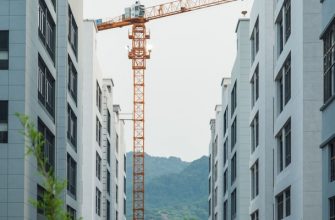- Revolutionizing Ownership: How RWA is Changing the Real Estate Landscape
- Understanding RWA: The Future of Fractional Property Investment
- From Traditional to Digital: The Impact of RWA on Real Estate Transactions
- Navigating the RWA Ecosystem: Opportunities and Challenges Ahead
- RWA Real Estate: Bridging the Gap Between Investors and Properties
- The Rise of RWA: Transforming Property Ownership for the Modern Investor
Revolutionizing Ownership: How RWA is Changing the Real Estate Landscape
In recent years, Real World Assets (RWA) have emerged as a transformative force in the real estate market. By integrating blockchain technology with property ownership, RWA offers a seamless way to buy, sell, and manage real estate assets. This innovative approach is reshaping the landscape of property ownership, making it more accessible and efficient than ever before.
One of the most significant advantages of RWA in real estate is the enhanced liquidity it provides. Traditional property transactions often involve lengthy processes and significant barriers to entry. In contrast, RWA enables fractional ownership, allowing multiple investors to own a share of a property. This democratization of real estate investment opens doors for a wider audience, thereby increasing market participation.
- Transparency: RWA utilizes blockchain technology to ensure that all transactions are recorded and verifiable, providing unparalleled transparency in property dealings.
- Efficiency: The use of smart contracts automates various stages of property transactions, reducing the time and costs associated with real estate deals.
- Accessibility: With RWA, investors can enter the real estate market with smaller amounts of capital, making property ownership more attainable.
- Diversification: RWA allows for fractional investments across multiple properties, enabling investors to diversify their portfolios with ease.
The implications of RWA extend beyond mere ownership. As the real estate sector increasingly adopts this model, the potential for innovation in property management and development will grow. By leveraging data analytics and smart contracts, property managers can optimize operations, improve tenant experiences, and maximize returns for investors.
In conclusion, RWA represents a pivotal shift in how real estate is perceived and transacted. With its focus on enhanced liquidity, transparency, and accessibility, RWA is poised to revolutionize property ownership, ushering in a new era where real estate investment is not just for the privileged few but a viable opportunity for many.
Understanding RWA: The Future of Fractional Property Investment
Understanding RWA, or Real World Assets, represents a pivotal shift in the realm of fractional property investment. RWA enables investors to allocate capital into tangible assets such as real estate, thereby democratizing access to property ownership. This innovative approach allows for fractional ownership, where multiple investors can own a share of a property, reducing the financial barriers traditionally associated with real estate investment.
The emergence of RWA in the real estate sector offers numerous advantages. Investors can diversify their portfolios without the necessity of significant capital outlay. By participating in RWA, individuals gain exposure to high-value properties, which were previously accessible only to affluent investors. This model not only enhances liquidity in the market but also fosters a sense of community among investors who share ownership of the same asset.
- Fractional investment reduces the initial capital requirement, making real estate accessible to a broader audience.
- RWA facilitates easier entry into lucrative markets, allowing investors to benefit from real estate appreciation.
- Transparency is enhanced through blockchain technology, ensuring secure and verifiable transactions.
- Investors can leverage fractional ownership to diversify their holdings across various properties and locations.
As RWA continues to evolve, the integration of technology will play a crucial role in enhancing the efficiency of property transactions. Digital platforms designed for RWA will streamline the investment process, enabling seamless transactions and management of assets. The future of fractional property investment looks promising, as RWA not only transforms how real estate is owned but also broadens the spectrum of potential investors.
In conclusion, the rise of RWA signifies a transformative era in property ownership, characterized by enhanced accessibility and investment opportunities. By embracing RWA, investors can partake in the benefits of fractional property investment, paving the way for a more inclusive real estate market.
From Traditional to Digital: The Impact of RWA on Real Estate Transactions
The transition from traditional real estate practices to digital methodologies marks a significant evolution in property transactions. RWA, or Real World Assets, is at the forefront of this transformation, streamlining the process of property ownership. By leveraging blockchain technology, RWA simplifies the complexities often associated with real estate transactions, enhancing transparency and reducing the potential for fraud.
In traditional real estate, transactions require extensive paperwork, multiple intermediaries, and a lengthy approval process. In contrast, RWA facilitates a more efficient and direct approach. The key impacts of RWA on real estate transactions include:
- Increased Efficiency: RWA allows for quicker transactions by eliminating the need for intermediaries and reducing bureaucratic hurdles.
- Enhanced Security: Using blockchain technology, RWA ensures that property ownership records are secure and immutable, minimizing the risk of fraud.
- Global Accessibility: RWA democratizes access to real estate investments, enabling individuals from various locations to participate in property markets without geographical limitations.
- Lower Costs: The digitization of property transactions through RWA reduces costs associated with paperwork and intermediary fees.
- Fractional Ownership: RWA enables fractional ownership of real estate, allowing investors to buy shares in properties rather than whole units, thus lowering the barrier to entry.
As the real estate industry embraces RWA, the implications extend beyond mere convenience. The shift towards digital transactions is reshaping how properties are bought, sold, and managed. The integration of RWA into real estate signifies a move towards a more transparent, efficient, and inclusive property market, paving the way for future innovations.
Ultimately, the impact of RWA on real estate transactions cannot be overstated. It represents a pivotal change in how assets are perceived, owned, and traded, making the property market more accessible and secure for all participants.
Navigating the RWA Ecosystem: Opportunities and Challenges Ahead
The RWA ecosystem represents a transformative shift in the realm of real estate ownership, offering unprecedented opportunities and challenges. As the real estate market embraces the integration of asset tokenization and blockchain technology, investors are presented with a new frontier in property ownership.
One of the primary advantages of this evolution is the enhanced accessibility to real estate investments. Tokenization allows fractional ownership, enabling a broader range of investors to participate in the property market. This democratization of real estate not only opens doors for smaller investors but also diversifies the investment landscape.
- Transparency: Blockchain technology offers unparalleled transparency, ensuring that all transactions are recorded and verifiable. This builds trust among investors and reduces the risk of fraud.
- Liquidity: The ability to buy and sell fractional shares of real estate assets improves liquidity, making it easier for investors to enter and exit investments.
- Global reach: RWA real estate transcends geographical barriers, allowing investors from around the world to invest in properties that were previously inaccessible.
- Reduced transaction costs: By streamlining the buying and selling process through digital platforms, RWA can significantly lower transaction fees associated with traditional real estate transactions.
However, navigating the RWA ecosystem is not without challenges. Regulatory uncertainties pose significant risks, as governments worldwide grapple with how to legislate and regulate tokenized assets. Investors must remain vigilant and informed about the evolving legal landscape to avoid potential pitfalls.
Additionally, the technological complexities associated with blockchain and tokenization can be daunting. Investors may face hurdles in understanding these technologies, which could hinder their ability to maximize the potential of RWA real estate.
Ultimately, while the RWA ecosystem presents significant opportunities for growth and innovation in real estate, it requires careful navigation. Investors must weigh the benefits against the inherent challenges, ensuring they are well-equipped to harness the full potential of RWA properties in the modern market.
RWA Real Estate: Bridging the Gap Between Investors and Properties
RWA Real Estate represents a groundbreaking approach to property investment, effectively bridging the gap between investors and available properties. This innovative platform facilitates seamless transactions and enhances accessibility for a diverse range of investors seeking to enter the real estate market.
By utilizing advanced technology and data analytics, RWA Real Estate identifies lucrative investment opportunities that align with the goals of its users. This system not only streamlines the property selection process but also provides comprehensive insights into market trends, enabling informed decision-making.
- Advanced property analysis tools
- Access to exclusive listings and investment opportunities
- Comprehensive market insights and reporting
- User-friendly interface for seamless navigation
- Strong focus on investor education and support
Furthermore, RWA Real Estate prioritizes transparency and security, creating a trustworthy environment for both buyers and sellers. This commitment to ethical practices fosters confidence among participants, encouraging more individuals to explore real estate investments.
In summary, RWA Real Estate not only simplifies property ownership but also empowers investors by providing them with the necessary tools and resources to thrive in the competitive real estate landscape. As the next frontier in property ownership, RWA Real Estate is poised to reshape the way individuals approach real estate investment.
The Rise of RWA: Transforming Property Ownership for the Modern Investor
The rise of Real World Assets (RWA) is reshaping the landscape of property ownership, offering innovative solutions for modern investors. RWA represents a paradigm shift, merging traditional real estate with blockchain technology. This integration enables fractional ownership, making it easier for individuals to invest in properties without the need for substantial capital outlay.
In the ever-evolving real estate market, RWAs provide enhanced liquidity and transparency. By tokenizing real estate assets, investors gain access to a broader range of property types, including residential, commercial, and industrial segments. This diversification not only mitigates risks but also opens new avenues for wealth generation.
- Fractional ownership allows investors to buy shares in high-value properties.
- Increased liquidity enables quicker transactions compared to traditional real estate sales.
- Blockchain technology ensures transparent and secure record-keeping.
- Access to global markets expands investment opportunities beyond local borders.
- Lower entry barriers empower a wider audience to participate in real estate investment.
As RWAs continue to gain traction, they are poised to disrupt conventional property ownership models. Investors now have the capability to leverage cutting-edge technology to optimize their portfolios. The democratization of real estate investment through RWAs not only enhances accessibility but also fosters a more dynamic and competitive market.
In conclusion, the emergence of RWA in the real estate sector signifies a transformative era for property ownership. By embracing these advancements, modern investors can capitalize on unique opportunities, driving innovation and growth within the industry.









